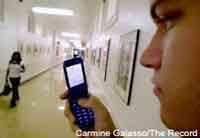 Handy… Literally!
Handy… Literally!
Engadget has a story on how Montclair State University in New Jersey is handing out free phones to it’s students to enable them to easier communicate with each other. The handsets feature software which allows them to receive “channels” of information, which users sign up for. These channels include things like the dinner menu and the location of the university’s shuttle buses, as well as channels students have set up of their own.
I can admit I am actually kind of jealous of this: I would love the ability to be able to do this at school, checking up on when holidays are, what’s on the menu, and what my time-table’s like. Sadly, I think my school would have some difficulty in preventing the chavs from selling them on eBay, which of course is an entirely different issue.
This is the problem with technology like this: Those most likely to adopt it are, by default, young people, who therefore can’t afford it. Give it to them instead then, and a select few will take advantage of that. Technology like this, for now, is only for older people I think. This isn’t to say it isn’t exciting though: I still find socio-technological implementations, usually referred to as MoSoSo (Mobile Social Software), fascinating, as although there isn’t yet much of a market for these sorts of services, there will inevitably be, and when there is, it could well change the way we communicate with each other forever.
 Sounds nasty!
Sounds nasty!
Everyone over here in Europe likes to text, or “txt” for short. I’m not entirely sure how popular the practice is over in the US, but in the UK it’s used mainly by teenagers, although others use it too, because of it’s extremely low cost in comparison to making voice calls.
The New York Times is reporting that apparently, using SPAMming techniques, it should be possible to flood a cities GSM infrastructure by sending as little as 165 text messages a second into the network. This is made possible because text messages use the same communications infrastructure and network that voice calls are made to as well. Imagine what could happen if someone flooded a network, so that no calls could be made, and then at the same time a co-ordinated terrorist attack occurred. People would be unable to call the emergency services, and wide-spread carnage and destruction would occur.
This is particularly scary for me, as I would be at a loss in an emergency without my phone: It’s central to how I find people and communicate with them, and when I really need to get in touch with them, I wouldn’t be able to. This reliance and taking for granted of technology is something that most of my generation are likely guilty of, and when everything does kick off and there’s no electricity, phones or water, I would have severe doubts that a lot of them would be able to cope with it.
It was only really recent events (London bombings) that brought this to my attention, but it has made me realise that reliance on technology could be very turned around and be used against us.
 That lot again
That lot again
Yes, that’s right, the RIAA are at it again: A short time ago, a case against a mother on her daughter’s behalf of file sharing was dismissed in court. Now, the RIAA are back, but this time, they’re not suing the mother but her 14-year old daughter.
People like the RIAA make me so, so angry: At 14, no-one really knows what they’re doing. So a little girl downloaded some of her favourite songs from the Internet. That little girl was probably a paying customer as well, but her pocket money just wasn’t enough, and she just wanted to hear one more song by her favourite artist, but couldn’t afford it. Her friend said “you can get it for free from here”, and so that’s what the girl did. Next thing she knew, the very company she was a customer of, was sending threatening letters to her, demanding thousands of dollars in compensation.
Is this the right way of treating your customers? I know for sure it is one great way of driving them away. If you are in my position at the moment, of having a good few thousand songs you enjoy, then stop buying music unless it is from your local bands or from an independent label. It might sound an unrealistic expectation, but I have found so many great bands on the Internet and locally at pubs and other music venues, that I am quite confident I will never be giving another penny to those greedy folks over at the RIAA.
You can do something about it though, by going to www.boycott-riaa.com. Every little helps!
That would be my rant for the day, have a nice weekend :-)
 Happy Birthday!
Happy Birthday! I found a screenshot of what Google used to look like on the Internet archive, and although it does obviously look a little old-school, it’s still much the same interface-wise as it is today:
I found a screenshot of what Google used to look like on the Internet archive, and although it does obviously look a little old-school, it’s still much the same interface-wise as it is today: It’s in Space, it’s got to be cool. Oh, actually, no nukes, so forget it
It’s in Space, it’s got to be cool. Oh, actually, no nukes, so forget it “Batman’s Blackberry”, but I still want one!
“Batman’s Blackberry”, but I still want one! Neat Idea!
Neat Idea! They’ve done it again
They’ve done it again It’s like the Middle Ages all over again!
It’s like the Middle Ages all over again! It’s funny, laugh!
It’s funny, laugh! Ew… That’s not nice!
Ew… That’s not nice! Flogging a dead horse… Literally
Flogging a dead horse… Literally Cool, I want one!
Cool, I want one! Ooh, Shiny, new and it rolls up!
Ooh, Shiny, new and it rolls up! Allah says no
Allah says no “Drop the ink cartridge and put your hands on your head!”
“Drop the ink cartridge and put your hands on your head!” Send Your Name To Pluto
Send Your Name To Pluto It’s fast, but why? Nice solution, but where’s the problem?
It’s fast, but why? Nice solution, but where’s the problem? That’s… Fast!
That’s… Fast! Big Brother is Everywhere
Big Brother is Everywhere It’s Tin For Win95
It’s Tin For Win95 Browse the Web on PSP
Browse the Web on PSP Upgrades To Flight Mode
Upgrades To Flight Mode We’ve had hackers doing all sorts of naughty things in the past, but one thing I heard about recently is new to me:
We’ve had hackers doing all sorts of naughty things in the past, but one thing I heard about recently is new to me:  It seems people are getting less civilized by the day: In a scene reminiscent of the riot caused by the
It seems people are getting less civilized by the day: In a scene reminiscent of the riot caused by the  Russian Cosmonaut Sergei Krikalev is now the person who has spent the
Russian Cosmonaut Sergei Krikalev is now the person who has spent the  This week, it seems like we have another nice example of people in government being quite the opposite of liberal and interfering with technology: Various suit-wearing, self-important men/women of power have objected to
This week, it seems like we have another nice example of people in government being quite the opposite of liberal and interfering with technology: Various suit-wearing, self-important men/women of power have objected to 
 First of all, space is cool from the perspective of a teenager, and there’s no worrying about how much tax payers money is put into these kind of projects. With this in mind, I was delighted to hear that the Shuttle
First of all, space is cool from the perspective of a teenager, and there’s no worrying about how much tax payers money is put into these kind of projects. With this in mind, I was delighted to hear that the Shuttle  Let’s start this week’s news with some nice, old-fashioned, technological paranoia: As a teenager, you start to realise that giving everyone your mobile number, letting people know where you live and freely handing out your email address can be a bad thing. Imagine my surprise then when I found out that the Australian government had
Let’s start this week’s news with some nice, old-fashioned, technological paranoia: As a teenager, you start to realise that giving everyone your mobile number, letting people know where you live and freely handing out your email address can be a bad thing. Imagine my surprise then when I found out that the Australian government had  DRM on motherboards
DRM on motherboards In other news: After years of Apple thinking themselves obviously superior by having just the one mouse button, and after years of jokes about how Mac users are inferior because they can’t use more than the one button, Apple has gone back and decided to bring out a mouse with not one, not two, but three buttons, as well as a four way scroll wheel. They have called their mouse, quite simply,
In other news: After years of Apple thinking themselves obviously superior by having just the one mouse button, and after years of jokes about how Mac users are inferior because they can’t use more than the one button, Apple has gone back and decided to bring out a mouse with not one, not two, but three buttons, as well as a four way scroll wheel. They have called their mouse, quite simply,